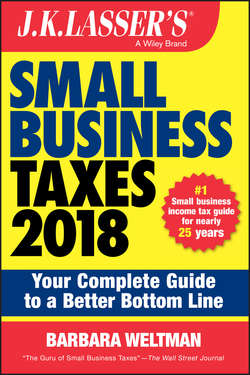Читать книгу J.K. Lasser's Small Business Taxes 2018 - Barbara Weltman - Страница 19
На сайте Литреса книга снята с продажи.
PART 1
Organization
CHAPTER 2
Tax Year and Accounting Methods
Uniform Capitalization Rules
ОглавлениеRegardless of your method of accounting, special tax rules limit your ability to claim a current deduction for certain expenses. These are called the uniform capitalization rules, referred to as the UNICAP rules for short. The uniform capitalization rules are a form of accounting method that operates in coordination with the accrual method, but overrides it. In essence, these rules require you to add to the cost of property certain expenses – instead of currently deducting them. The cost of these expenses, in effect, are recovered through depreciation or amortization, or as part of the costs of goods sold when you use, sell, or otherwise dispose of the property. The uniform capitalization rules are complex. Important things to recognize are whether you may be subject to them and that expenses discussed throughout this book may not be currently deductible because of the application of the uniform capitalization rules.
Capitalization Required
Unless one of the exceptions is applicable, you must use the uniform capitalization rules and add certain expenses to the basis of property if you:
● Produce real property or tangible personal property for use in your business or for sale to customers (producers), or
● Acquire property for resale (resellers).
EXCEPTIONS TO THE UNICAP RULES
There are many exceptions to the uniform capitalization rules. Small businesses may be able to escape application of the uniform capitalization rules by relying on one of these exceptions.
● You do not have to capitalize costs if the property you produce is for your personal or nonbusiness use.
● You do not have to capitalize costs if you acquire property for resale and your average annual gross receipts do not exceed $10 million (small reseller exception). If a reseller has been in business for less than 3 years, application of the exception is determined by annual gross receipts for the shorter period.
● Creative expenses incurred by freelance authors, photographers, and artists are not subject to the uniform capitalization rules. According to the IRS, this exception does not apply to a musician's demo tape or other sound recording.
● There is a de minimis exception for certain producers who use a simplified method and whose total indirect costs are $200,000 or less.
● There are other exceptions not detailed here, for certain farming businesses and other types of businesses.
CAPITALIZED COSTS
If you are subject to the uniform capitalization rules, you capitalize all direct costs of your production or resale activities. Direct costs for producers include direct material costs and direct labor costs. Direct costs for resellers mean acquisition costs.
You also capitalize a portion of indirect costs. Indirect costs for producers and resellers include costs of purchasing, handling, and storage, as well as taxes, interest, rent, insurance, utilities, repairs, engineering and design costs, quality control, tools and equipment, licensing, and more.
Change in Accounting Method
If you want to change your method of accounting (for example, from the accrual method to the cash method), you must file Form 3115, Application for Change in Accounting Method (Rev. Dec. 2015), during the year for which the change is to be effective. (Instructions on how and where to file this form are included in instructions to the form.) Some changes are automatic – just by filing you are ensured that your change is recognized; other changes require the consent of the IRS.
Periodically, the IRS modifies its list of automatic changes (see Revenue Procedure 2017–30 for the latest list of automatic changes). These include changing to a required accounting method from an incorrect one, switching to the cash method by an eligible small inventory-based business, implementing depreciation changes pursuant to a cost segregation study, changing the treatment of repair and maintenance costs from capitalized to currently deductible, deducting the cost of “smallwares” (such as dishes and glassware) in the year they are first put to use by restaurants, and applying the de minimis rule for certain repairs.
The IRS created a simplified change in accounting procedure to small businesses with respect to certain changes under the so-called repair regulations (explained in Chapter 10) that eliminates the need to file Form 3115 entirely. Revenue Procedure 2015–20 as updated in Revenue Procedure 2017–30, applies to small businesses (those with assets under $10 million or average annual gross receipts for the 3 prior years under $10 million). Those that qualified are able to simply make the change on the return without any special reporting or notification to the IRS. However, some tax experts advise small businesses to file Form 3115 even though not required in order to obtain audit protection for prior years in which expenses were covered by these regulations.
